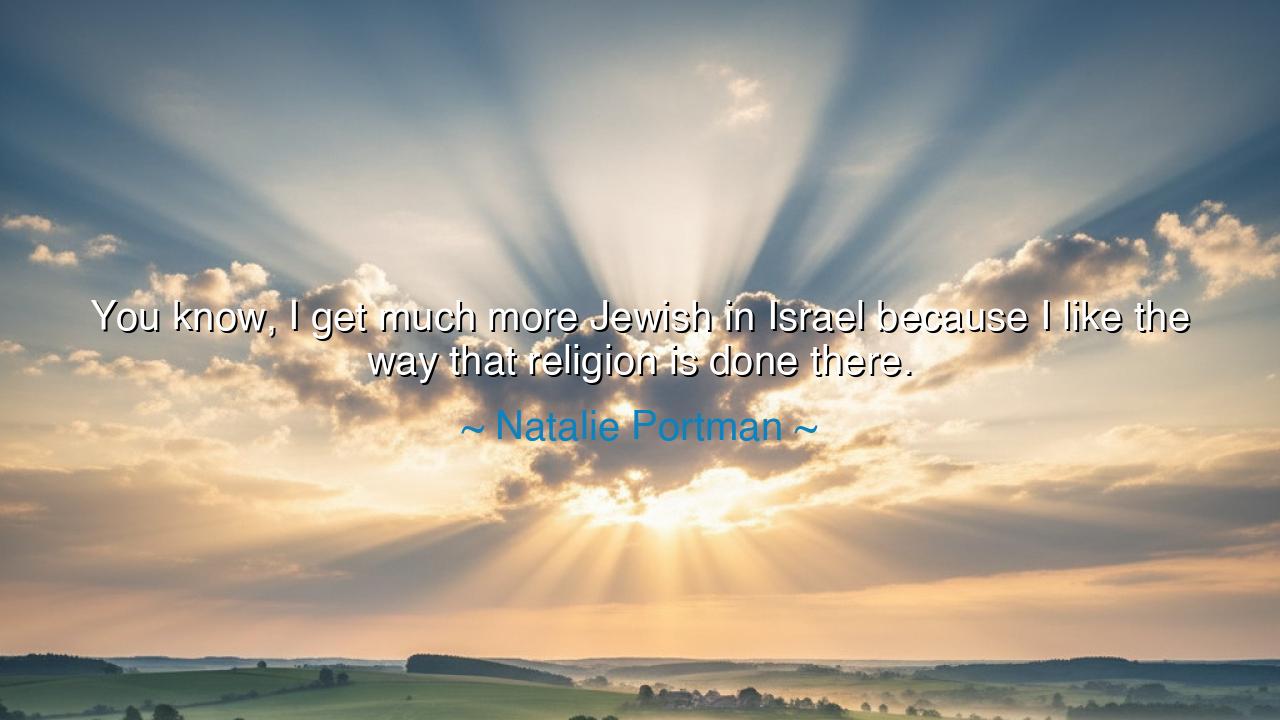
You know, I get much more Jewish in Israel because I like the way
You know, I get much more Jewish in Israel because I like the way that religion is done there.






"You know, I get much more Jewish in Israel because I like the way that religion is done there." These words from Natalie Portman offer a glimpse into the profound relationship between identity, culture, and religion. To understand the deeper meaning of her statement, we must first acknowledge the sacred connection that exists between religion and the land of its birth. For Portman, a Jewish woman, visiting Israel becomes an immersive experience, where her connection to her Jewish identity is rekindled, not merely through the beliefs and practices she’s grown up with, but through the living expression of those beliefs in the land that has long been the heart of the Jewish people.
In the ancient world, religion was not just a set of beliefs or rituals; it was a way of life, a deeply integrated part of the fabric of existence. Israel, as the Holy Land for Jews, was central to the spiritual identity of the Jewish people for millennia. The temples and sacred spaces that dotted the land were not merely places of worship—they were embodiments of the divine presence itself, a place where the earthly and the divine met. To live in Israel, then, is not merely to practice Judaism as one might in a foreign land, but to immerse oneself in the land itself—where faith and identity merge with the soil, the air, and the history that surrounds you.
Portman’s statement reflects this deep connection between religion and place. She speaks not of a theoretical or distant religious practice, but of something more visceral, more immediate. Israel does not merely offer a space for Jewish worship; it offers a context in which that worship is not an isolated activity but a living, breathing part of everyday life. From the Shabbat dinners that bring families together, to the daily observances and the festivals that connect individuals to their community and their history, religion in Israel is not confined to a synagogue or a prayer book. It flows through the streets, it echoes in the sounds of the markets, and it shapes the rhythms of daily existence. Portman finds herself drawn more deeply into her Jewishness because she is immersed in a culture that lives its faith in a way that feels both natural and powerful.
Consider the ancient pilgrimages that Jews made to Jerusalem, to the Temple Mount, for centuries. Just as Israel is a central hub for Jewish identity today, it was once the heart of the ancient Jewish world, where people traveled from all corners to connect with the sacred. The experience was transformative—not just for the physical journey, but for the spiritual renewal it offered. Jerusalem was not simply a destination; it was a place of becoming, a site where Jews gathered to renew their covenant with God and to participate in the communal identity that united them as a people. Today, even in the modern age, Portman’s experience echoes the ancient truth that a deep connection to the land brings a deeper understanding of one’s spiritual identity.
Portman’s words also remind us of the power of place in shaping our relationship with faith. In many ways, religion is lived not just through doctrine, but through the environment in which it is practiced. Israel offers a living connection to the past, allowing individuals to practice their faith in the very land where their ancestors walked, prayed, and built the foundations of their culture. In this way, religion in Israel is not just a belief; it is a heritage, passed down through generations and woven into the landscape itself.
The lesson here is clear: there is profound power in place—in the roots of identity and the connection between faith and the land. Whether we practice a religion or not, we must understand that identity is shaped by history, culture, and the spaces we inhabit. To truly understand who we are, we must engage with the places that have shaped our beliefs, our traditions, and our very sense of self. Just as Portman finds herself more connected to her Jewishness in Israel, we, too, must find those spaces where our identity is most deeply felt, where our connection to history and spirit is most alive.
In our own lives, let us strive to cultivate a deeper understanding of our roots—whether spiritual, cultural, or familial—and allow those connections to shape how we move in the world. We must honor the spaces that give us strength and help us understand our place in the grand story of humanity. Let us not be passive in our identity but actively engage with the places and practices that give our lives meaning. Just as Portman finds her Jewishness deepened by Israel, let us find the places that help us renew our own sense of self and purpose. Let us return to them, embrace them, and allow them to guide us on our own journeys.






AAdministratorAdministrator
Welcome, honored guests. Please leave a comment, we will respond soon